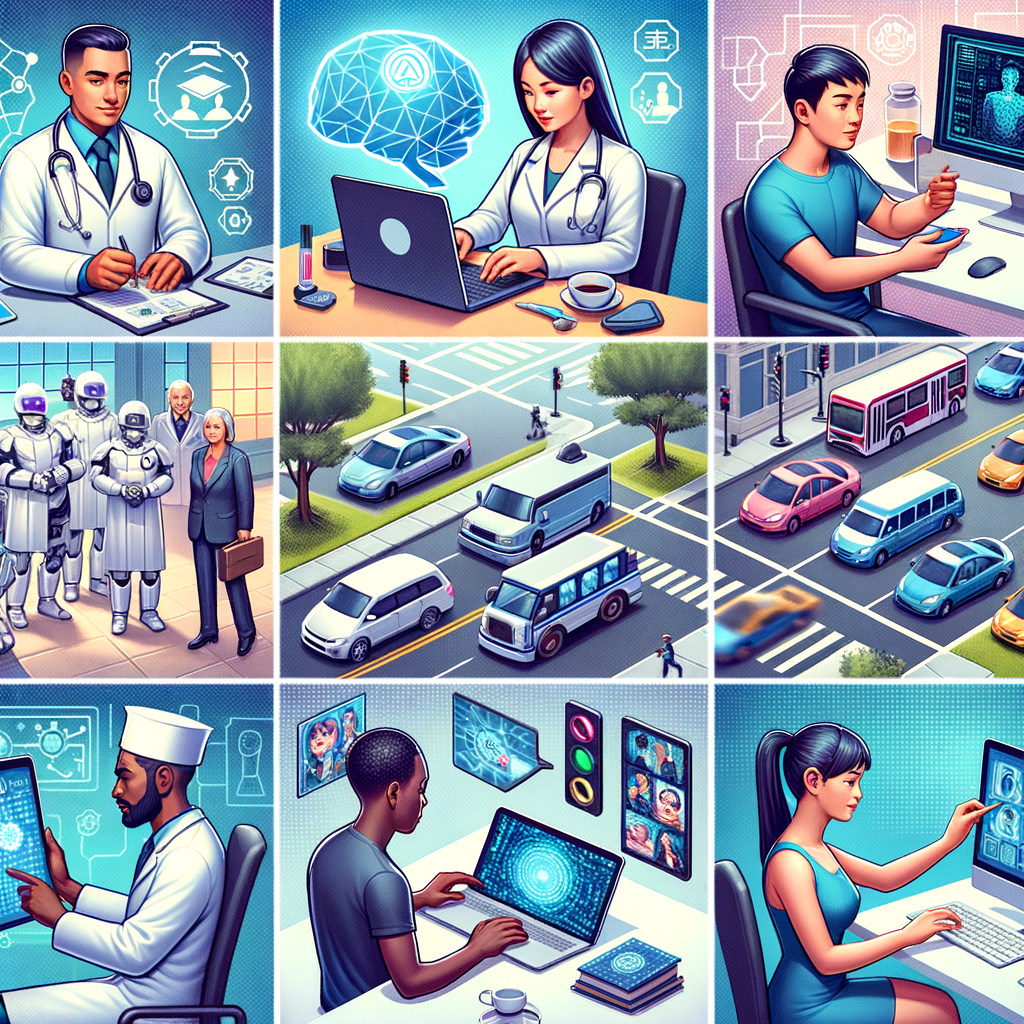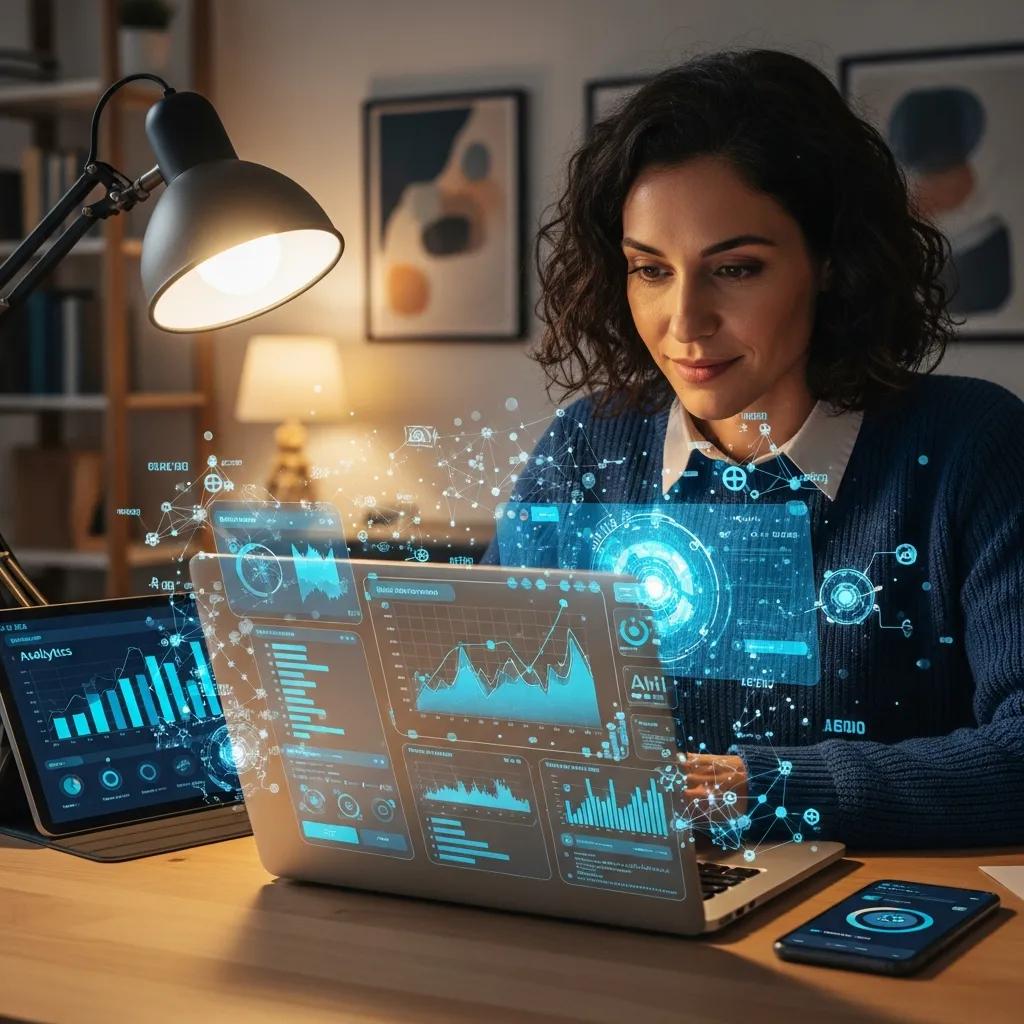You’ve likely heard about artificial intelligence and its growing influence. But understanding the true impact of AI application examples can be challenging. This post clarifies how AI is reshaping our lives now with practical and extraordinary examples.
AI Applications Examples: Transforming Industries
AI is revolutionizing industries, often unseen. McKinsey predicts AI could boost productivity by 30% across most sectors. A Gartner survey found 37% of organizations have adopted AI.
Healthcare: From Diagnosis to Drug Discovery
AI helps medical professionals by detecting potential diseases early. It analyzes individual medical histories to provide insights into possible disease progression. AI assists in drug discovery, making the process faster and safer.
This ability to handle vast data allows for predictions and forecasts, aiding data professionals. The development of synthetic data, monetized through platforms like Amberflo, accelerates testing for improved, affordable products.
AI is now a trusted diagnostic tool for medical experts, and facial recognition can even help track patient medication adherence. Adaptive learning systems allow doctors to access the most up-to-date treatment guidelines, streamlining workflows and optimizing patient care.
Transportation: The Rise of Autonomous Vehicles
Self-driving cars, using AI and computer vision, aim to improve road safety. Studies suggest they could reduce accidents caused by human error by 90%. AI is transforming logistics too, through smart traffic light control.
Computer vision helps robots take over tasks in dangerous environments, improving worker safety. AI-powered systems optimize delivery routes with services like drone delivery, leading to faster shipping times.
Education: Personalized Learning Experiences
AI tailors lessons for individual learning styles. From AI portals to virtual assistant apps, educational access is expanding globally. AI chatbots address class registration questions.
Wolfram Alpha, an AI computational engine, explores real-world applications of theories. AI assistants also help students with non-academic questions. Adaptive learning platforms like Khan Academy give students customized lessons.
For test preparation, platforms like Magoosh offer AI-powered feedback. Magoosh analyzes performance to deliver practice questions. This approach targets weak areas for more effective learning.
Tools like IBM Watson Discovery assist researchers by interpreting data. This process speeds up discoveries, aiding education and other fields. These learning platforms use data science to optimize the learning experience.
Exploring More AI Applications Examples
Let’s move from industry uses to relatable, everyday AI examples integrated into our daily lives.
Entertainment and Social Media: Personalized Content Feeds
Entertainment platforms utilize AI to cater to viewer preferences. These apps monitor user activity. AI algorithms suggest content deemed enjoyable.
Whether it’s Facebook, TikTok, Spotify, or YouTube, AI customizes feeds. It uses preferences, past activity, and gathered user data. This AI technology creates a personalized user experience.
E-commerce: Personalized Shopping
Online stores use AI to track your purchases and suggest similar items, enhancing the shopping experience. Personalized product recommendations drive sales by offering relevant products.
Targeted deals through AI improve customer satisfaction and revenue. AI-powered chatbots offer instant customer support, further enhancing the user experience.
Finance: Fraud Prevention and Tailored Investments
AI enhances financial security with risk management capabilities. Machine learning flags unusual transactions and potential fraud attempts.
AI streamlines loan and investment approvals, generating personalized plans. This provides 24/7 access to tailored financial advice. Predictive analytics helps financial institutions assess risk more effectively.
Smart Homes and Daily Assistance: Streamlining Everyday Life
AI simplifies daily routines. Smart devices rely on AI through mobile apps. AI manages smart thermostats, refrigerators, and schedules through voice commands.
Voice assistants like Alexa utilize natural language processing for realistic conversations. AI-powered devices offer a diverse range of voice recognition services, from managing smart homes to making product recommendations.
Travel: Enhanced Travel Planning and Experiences
AI helps travelers discover new experiences. AI-powered tools offer various travel and adventure options. They identify destinations and landmarks, enhancing travel experiences.
Apps like Google Maps and Waze use AI for optimized routes and real-time traffic updates. AI transforms travel planning and navigation, simplifying trips. AI applications are becoming crucial in the travel industry, and the insights derived from them improve the user experience.
FAQs about AI Application Examples
What is an example of an AI application?
A common example is a virtual assistant like Siri or Alexa. These use voice recognition and AI algorithms to understand commands and respond.
Other examples include personalized recommendations on streaming platforms and e-commerce websites. Email spam filters and bank fraud detection systems also use AI.
AI is present in image recognition software, language translation tools, and autonomous vehicles. AI models enhance a wide range of daily activities.
What are the applications of AI today?
AI is widely applied across diverse industries today. In healthcare, it assists with diagnoses. Manufacturers use AI to streamline processes, while educators utilize AI for personalized learning.
In business, AI enhances marketing and customer service. It also plays crucial roles in environmental protection, smart city development, and cybersecurity. Voice assistants have also become a major use of AI technology.
What are 3 uses of AI in daily life?
Three common uses include personalized content feeds on social media and streaming services. Navigation apps with real-time traffic updates are another daily use.
Smart home devices controlled by AI are also increasingly prevalent. AI algorithms improve our lives in various ways.
What AI app is everyone using?
Popular AI apps include ChatGPT and Gemini. They use large language models like GPT-4 and advanced natural language processing. These apps can generate creative text and engage in human-like conversation.
The Future of AI Transformation
AI application examples show it’s more than just technology; it’s transforming lives. From everyday tasks to complex healthcare systems, AI is having an impact. AI plays a crucial role in improving healthcare systems, including diagnostic imaging.
Current AI capabilities are only the beginning. The future potential of AI is immense, spanning industries, daily life, and global issues. AI algorithms analyze large datasets to create more accurate diagnoses.
Understanding AI’s applications highlights its power to assist, simplify, and innovate. It’s a powerful force improving lives and shaping the future.






